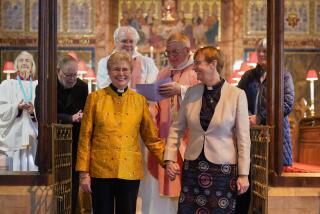A Different Drummer : New Anglican Leader Is Known for His Strong Beliefs
- Share via
CANTERBURY, England — George Carey, the next archbishop of Canterbury, scoffs at reports of the death of the Church of England.
“The church is not in a terminal state of decline and death. That is absolute rubbish,” he says. “Only people who know very little of it make statements like that.”
Carey, 55, is a fervent believer taking charge of a church which has fewer and fewer adherents and--its critics say--fewer and fewer beliefs.
“People feel we are far too woolly and don’t believe in anything anymore,” Carey said in an interview following his selection in July.
Unlike David Jenkins, the bishop of Durham who is known for his doubts about the incarnation and the Resurrection, Carey is apt to be known for his strongly held beliefs.
He thinks that women should be priests. He believes that “God is green.” He is impatient with institutions.
“The word ‘church’ seems so static,” he says. “It represents in many people’s minds a church building. The idea of a movement, a Jesus movement, is much more dynamic.”
This drew fire from traditionalists who complained that as a vicar and bishop, Carey encouraged charismatics who believe in spontaneous worship.
Carey introduced guitars, clapping and aisle-dancing at services. He cheerfully recalls that one parishioner, remembered only as Mrs. Lee, told him: ‘I have never experienced such a hullabaloo in all my life . . . I hope this morning’s scenes will not be repeated.”
The new archbishop is determined that they will be.
Carey belongs to the “low church” evangelical wing which stresses the importance of Bible teaching, in contrast to the “high church” Anglo-Catholics who like ceremony and liturgical tradition and are repulsed at the prospect of women priests.
The evangelical wing is where the action is these days.
“The growth of the evangelical movement is part of a conservative backlash in the church which is taking place in many countries in a reaction against the lack of concern for religion,” says Provost David Edwards of London’s Southwark diocese.
Carey will be enthroned in April in Canterbury Cathedral as the 103rd archbishop in line from Augustine, the missionary from Rome who became the first bishop of the English nearly 1,400 years ago.
The archbishop is also leader of the world’s 70 million Anglicans in 164 countries, including 2.5 million U.S. Episcopalians. The churches are self-governing, unlike the Roman Catholics who are centrally directed from Rome, but the archbishop of Canterbury is seen as a unifier.
Carey, son of a hospital porter, left school at 15 without qualifications and found himself 38 years later living in a moated palace as bishop of Bath and Wells, his last appointment before Canterbury.
Carey served in the Royal Air Force as a radio operator and then studied theology and married. He and his wife, Eileen, have two sons and two daughters.
He was ordained in 1962 and was curate in a London church. He taught theology before becoming a parish priest and was principal of Trinity Theological College, Bristol, when he was made a bishop in 1988.
As archbishop of Canterbury, he will reside in official homes in Canterbury and London and receive $72,400 a year.
The funds come from the Church Commissioners who control assets of $5.7 billion in stocks, real estate and mortgages and loans.
He is a fan of London’s Arsenal soccer club, likes TV soap operas and is fond of a pint of beer. His appeal to ordinary people and his decisiveness convinced the church appointments panel that he had what the church needs.
As the archbishop of Canterbury, Carey succeeds Robert Runcie, who frequently crossed swords with Margaret Thatcher, the former prime minister and Conservative Party leader.
The Church of England, once known as the Tory party at prayer, was a thorn to Thatcher during her 11 1/2 years in office when she preached free-market solutions for the nation, and self-help for the down and out.
The bishops, close to the grass roots in their 43 dioceses across England, warned of growing deprivation and homelessness as industry declined, bankruptcies and unemployment grew, welfare was cut and mortgages failed.
“At a time when political opposition to the Tories was weak, the church found itself taking up the opposition’s role in telling the Tory party that its policies were leaving a lot of people behind,” says John Taylor, bishop of St. Albans.
Major issues facing Carey are seen as relations with the governing Tories; reforming the church’s policy-making and cumbersome General Synod of bishops, clergy and laity; preventing a split in clergy and congregations if there is final approval of women priests and dealing with pressures for and against tolerance of homosexual clergy.
The Church of England estimates its baptized numbers at 28 million of the 46 million population and is officially the church of the nation. Traditionally, it accepts pastoral responsibility for everyone, including the 8 million Protestants, 4 million Roman Catholics, along with Jews, Muslims, Hindus, Sikhs, Buddhists and others.
But support for all religions has been in relentless decline.
An opinion survey of young people in September found 19% of Anglicans and 11% of Roman Catholics without any belief in God.
Fewer than 5% of the population go to church regularly and less than 10% are involved in any religious faith.
“People believe a little bit less in each generation,” says Taylor of St. Albans.
More to Read
Sign up for Essential California
The most important California stories and recommendations in your inbox every morning.
You may occasionally receive promotional content from the Los Angeles Times.













